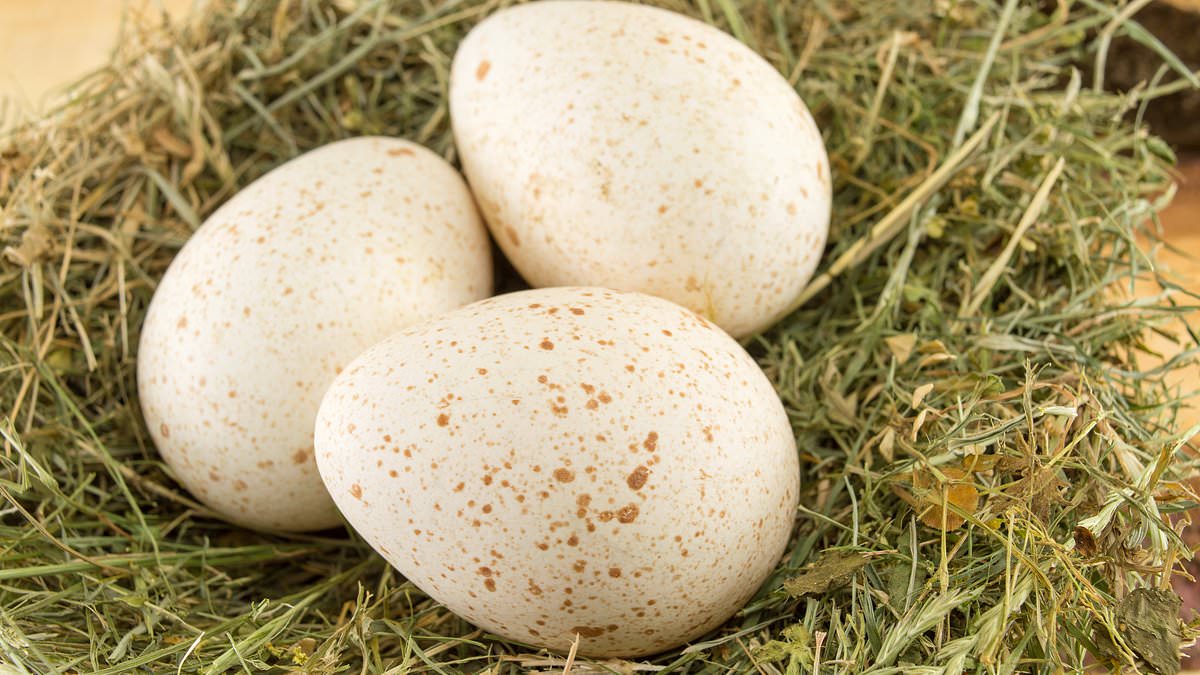While Americans feast on turkey this Thanksgiving, many have questioned why the bird’s eggs are not on the menu – and it all comes down to the cost.
Unlike chickens that produce one egg every 24 hours or so, turkeys drop maybe two a week.
‘Turkeys have a longer life cycle so they need to get to about seven months before they are able to produce laying eggs,’ said Kimmon Williams of the National Turkey Federation
Chickens only have to reach about five months before they can start laying eggs.
Experts have also noted that turkeys need more food and larger housing, adding more costs to consumers.
Farmers would have to sell each turkey egg for at least $3, making a full dozen $36, compared to the average $3.00 cost for their feathered counterparts.
The larger bird’s eggs also contain twice as many calories, grams of fat and three times the cholesterol as those from hens.

Farmers would have to sell each egg for at least $3, making a full dozen $36, compared to the $3.00 average cost for their feathered counterparts
Some cooking professionals have said that turkey eggs are better for sauces because their yolks are creamier and richer, Slate reported.
But the recommendations are not enough to get them on menus in the US.
While the people of today may not even think about turkey eggs, the food was popular among Native American tribes and early European settlers hundreds of years ago.
Chickens did not arrive in the nation until the 1500s, leaving turkey eggs the only option for Native Americans who later introduced the food to early European settlers in the 1600s.
The large, wild birds were exotic animals to Europeans who became instant fans.
Early Spanish explorers to the New World even returned home with turkeys, but rumors quickly spready that the eggs were linked to outbreaks of leprosy.
The suspicions were largely among the French, who were wary about the birds’ foreign origins.
But back in the US, the new settlers viewed the eggs as a luxury.

Today, turkey eggs are a rarity, sought mainly by food enthusiasts or farmers looking to meet the demand for Thanksgiving
By the 18th century, their popularity in the US had grown so much that domestication of turkeys became widespread.
New York’s iconic Delmonico’s restaurant, for instance, served turkey eggs scrambled or poached, as well as in frittatas and omelets.
However, the rise of industrial poultry farming during the 20th century changed the landscape of American food.
Technological advancements allowed farmers to specialize chickens for egg production or meat, making chicken eggs more cost-efficient and readily available.
As a result, turkey eggs began to lose favor, and even Delmonico’s eventually removed them from their menu.
Today, turkey eggs are a rarity, sought mainly by food enthusiasts or farmers looking to meet the demand for Thanksgiving.
Read More
What Baskin-Robbins' 4,800 calorie turkey cake REALLY tastes like

In 2024, the U.S. Department of Agriculture (USDA) reported a shortage of turkey eggs. As of June 1, 2024, inventories of turkey eggs in incubators fell to their lowest level since 1988, with just 22.8 million eggs.
This shortage, attributed to outbreaks of avian influenza and the loss of breeding flocks, contributed to a 6% decrease in turkey production this year compared to 2023.
Americans paid, on average, about $2.08 per pound, which is about $31 per bird that feeds 15 people.
And even there was a low number of turkeys, the price was down 12 percent since last Thanksgiving.
